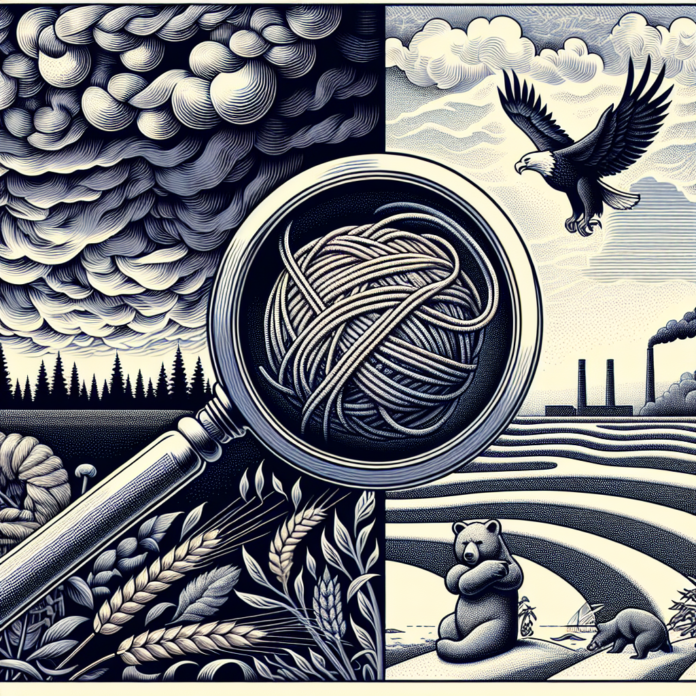Russia, Collusion, and Lies: Trump’s Ethical Quandaries
The political landscape of the United States has often been a reflection of its ongoing struggles for identity and ideals. The 2016 presidential election crystallized one such significant moment, defining a stark division between progressive aspirations and reactionary entrenchment. At the heart of these tumultuous times lay allegations of Russian collusion and an intricate web of deception woven by the Trump administration—a phenomenon with roots deeper than mere political rivalry, touching on profound ethical quandaries.
To understand the crux of these ethical dilemmas, one must consider the broader historical context. The United States has long prided itself on the principle of democratic integrity. Yet, the allegations of Russian interference in the 2016 election shook this foundation, suggesting that foreign influence may have subverted American autonomy. The popular narrative alleges that Trump’s campaign colluded with Russian operatives to undermine the democratic process, a scenario that raises ethical questions about loyalty, integrity, and the very soul of the nation.
Traditionalism, often touted by the conservative base supporting Trump, espouses a return to “simpler times” or so-called “American values.” However, when scrutinized, these values frequently cloak a resistance to progress and inclusion under the guise of preserving heritage. Trump’s rhetoric, marked by xenophobic overtones and regressive social policies, typified this. The alleged collusion with Russia, a nation known for its autocratic governance and suppression of dissent, further underscores this paradox. Is preserving “traditional” values worth the price of ethical compromise and foreign manipulation?
Progressive values, in contrast, emphasize inclusivity, social justice, and ethical governance. These ideals find a poignant advocate in Pope Francis, whose papacy has been marked by a forward-looking vision of Catholicism. Francis’s focus on mercy, environmental stewardship, and a preference for the poor signaled a shift from the conservative rigidity often associated with the Church’s hierarchy. This modernity stands in sharp contrast to Catholic traditionalists who lament the Latin Mass’s decline and resist changes aimed at making the Church more accessible and relevant.
Notably, the culture surrounding the Latin Mass often symbolizes this deeper resistance to change. Latin, a beautiful but arcane language, becomes a metaphor for an unwillingness to engage with the modern world. How telling is it that at a time when the Church under Pope Francis seeks to advocate for the marginalized and address contemporary issues, factions within its own house cling to the past?
Similarly, Trump’s ethical dilemmas can be seen as a microcosm of a broader struggle between regression and progress. His administration’s ethical challenges were manifold—ranging from nepotism within the White House, conflicts of interest, to blatant disinformation campaigns. These practices did more than merely undermine faith in government; they revealed a deliberate erosion of ethical norms that many had taken for granted. Traditionalists, who might celebrate the rollback of progressive policies, paradoxically find themselves supporting an administration that defies traditional ethical principles of truth and accountability.
The Russia investigation, led by Special Counsel Robert Mueller, brought these ethical concerns to the forefront. While the investigation’s legal findings did not conclusively prove collusion, they illuminated a landscape riddled with ethical violations. Trump’s repeated attempts to impede the investigation, coupled with the administration’s refusal to hold Russia accountable for its interference, highlighted a disregard for democratic principles. Such actions beg the question: can ethically compromised leadership champion the values it claims to uphold?
Historians often point out that crises reveal character. Amidst the allegations of Russian interference and Trump’s myriad ethical breaches, we observed a profound test of America’s identity. The nation stood at a crossroads: would it embrace an inclusive, ethical vision for its future, or retreat into a past marred by exclusion and deception?
The implications of these ethical quandaries extend beyond mere political theatre. Young generations, who are more diverse and socially conscious, witnessed these events unfold. Their grasp of history is not just informed by textbooks but by historical moments they experience in real-time. The contrast between Trump’s traditionalist rhetoric and progressive values advocated by figures like Pope Francis shapes their understanding of what ethical leadership should embody.
As time moves forward, the lessons from Trump’s ethical quandaries and the spectre of Russian collusion will live on. History will judge this period not only by the outcomes but by the principles that were challenged and, ultimately, the choices that were made. It is a moment that compels the nation to reflect on its values and the path it wishes to tread, advocating for progress and integrity over regression and deceit.
In conclusion, while traditionalism clings to a nostalgic vision often misaligned with ethical realities, progressive values offer a way forward—one rooted in inclusivity, honesty, and a genuine commitment to the common good. The Trump administration’s ethical challenges reveal the dangers of forsaking these ideals and serve as a clarion call to embrace a future built on the solid ground of ethical integrity and progressive vision.
